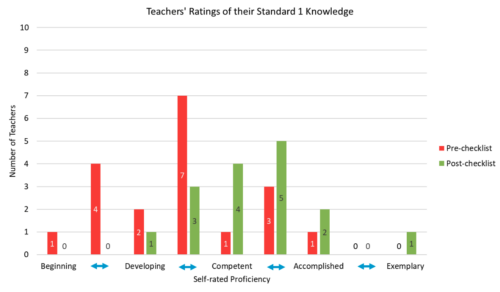Coaching to Support CS Teacher Development – Knowledge and Skills
Many teachers in the United States are just starting to learn how to teach computer science (CS). However, the majority do not have others nearby with CS teaching experience to provide support. Further, after educators complete CS professional development, there are few opportunities for individual feedback on their classroom practice and other means to support CS teacher development.
Piloting a Coaching Program
To address this gap, the Northern Lights Collaborative, CodeSavvy, and the Institute for Advancing Computing Education (IACE) piloted and studied the impacts of a one-year remote coaching program designed to provide individualized support to teachers. The coaching model used in this study is designed around the CSTA Standards for CS Teachers (CSTA, 2020) and accompanying resources and to focus specifically on teaching practices that meet students’ needs.
Our research question for this project was: How does teachers’ ability to apply CS practices and knowledge of CS concepts change after the coaching process?
We used a mixed-methods study that leveraged three primary forms of data from teachers who were coached (coachees) and teachers providing coaching (coaches): pre- and post-surveys, coaching logs, and self-reflection checklists.
Highlights
Coachees’ reported CS knowledge and skills related to Standard 1 were significantly higher than before intervention, indicating preliminary evidence that the intervention increased CS coachees’ reported knowledge and skills. Coachees also showed growth in their knowledge of CS concepts and ability to apply CS practices. Coaches provided encouragement, advice, suggestions, and reflective questions to help coachees grow in their ability to teach CS. In the survey, coachees’ rated their knowledge of and their abilities to apply CS concepts significantly higher after the intervention compared to before intervention.

As more teachers continue to learn how to teach CS and hone their skills and practices, engaging these teachers in coaching can be powerful in improving their student’s learning. Professional development providers and regional education agencies (districts and schools) could leverage the processes formed through this intervention (which is based on professional development practices with solid evidence for positive impacts) to provide similar coaching to teachers just learning how to teach CS.
You can read our paper here. To cite this article, please use Rosato, J., Tise, J., Thigpen, L., Brunson, F. & McGill, M. (2025). Coaching as a Means to Support Teacher Development of Computer Science Knowledge and Skills. In Proceedings of SITE 2025 (pp. 1782-1792). Waynesville, NC USA: Association for the Advancement of Computing in Education (AACE). Retrieved March 20, 2025 from https://www.learntechlib.org/primary/p/225756/.
This material is based upon work supported by the U.S. National Science Foundation under Grant No. 2122511. Any opinions, findings and conclusions or recommendations expressed in this material are those of the author(s) and do not necessarily reflect the views of the National Science Foundation.

Comments are closed